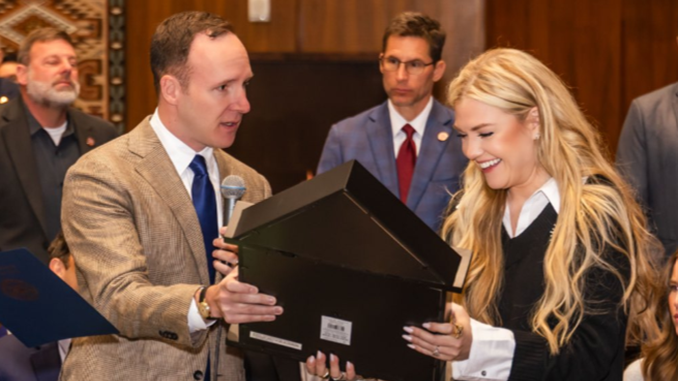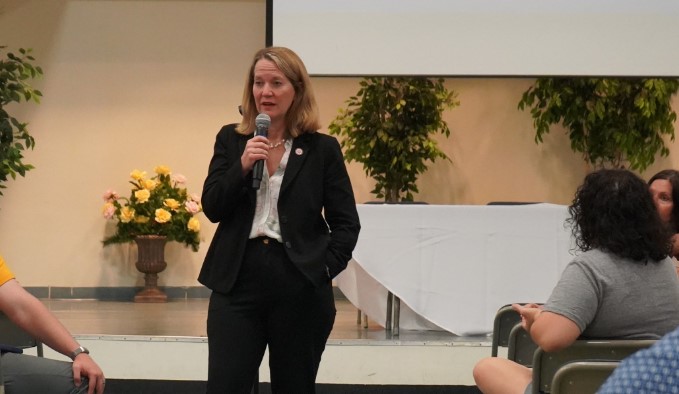
by Matthew Holloway | Feb 4, 2026 | Economy, News
By Matthew Holloway |
Arizona’s growing role as a national hub for data centers could be undermined by municipal regulations driven by concerns over water use, electricity demand, and land use, according to a new policy report released by the Goldwater Institute. The report, Data Centers: A Free Market Model for the Digital Future, argues that Arizona’s success in attracting data center investment stems from long-standing policy choices that favor predictable regulation, private property rights, and a stable legal environment.
The authors note that “artificial intelligence has dramatically accelerated these trends. Demand for data has increased exponentially. How communities, businesses, and policymakers respond to this transformation will shape economic competitiveness for decades to come.”
The report also cautions that a rise in local-level restrictions could threaten the state’s competitive position in the digital infrastructure sector.
William Beard, municipal affairs liaison at the Goldwater Institute and a co-author of the report, explained, “Data centers are the physical backbone of cloud computing, artificial intelligence, digital commerce, and national security. They are core infrastructure, no different in principle from transportation networks, energy production, or large-scale agriculture built to meet the demands of a particular era.”
Beard added that Arizona’s emergence as a leader in data center development has already produced economic benefits for the state. “Arizona is thriving as a leader in data centers, the state is reaping the economic benefits, and policymakers must take steps to ensure that continues,” he said.
According to the report, the Greater Phoenix region has become one of the top data center markets in the United States, with capacity projected to exceed 5,000 megawatts—an expansion of more than 500 percent. Goldwater attributes the dramatic growth to regulatory predictability and policies that encourage investment rather than discourage it, as well as “affordable land; reliable energy; and a legal environment anchored in strong private property rights.”
However, the report also warns, “Continued growth is no guarantee, especially as local governments threaten data centers with restrictive policies.”
Data center developments, such as the 290-acre data center Project Blue in Pima County and Project Baccara in Surprise, have sparked heated controversy at the municipal and county levels.
Citing growing municipal resistance to data center projects, Jen Springman, coalitions manager at the Goldwater Institute and a co-author of the report, said opposition is often rooted in misunderstandings about the impacts of infrastructure.
“Arizona’s advantage is increasingly threatened by a growing municipal-level regulatory backlash, often driven by misconceptions about water use and electricity demand,” Springman said.
Regarding water consumption, Springman said, “Modern data centers are among the most water-efficient industrial facilities ever built.”
The report further challenges claims that data center development is responsible for rising electricity prices. “Electricity prices, meanwhile, are not a data center problem; they are a policy outcome,” Springman said.
She added that misdirecting blame can lead to ineffective policy responses. “Blaming infrastructure for political energy choices obscures the real cause—and produces the wrong solutions,” Springman said.
Goldwater’s report argues that local restrictions do not reduce demand for digital services, but instead risk shifting investment to other states while increasing costs for consumers and businesses.
In a summary of the report’s conclusions posted to X, Goldwater stated, “The question is not whether data centers will exist, but whether Arizona will continue to lead—or retreat in the face of the future.”
Matthew Holloway is a senior reporter for AZ Free News. Follow him on X for his latest stories, or email tips to Matthew@azfreenews.com.

by Ethan Faverino | Feb 4, 2026 | News
By Ethan Faverino |
The Arizona House of Representatives paid tribute to the life and legacy of Charlie Kirk, founder of Turning Point USA, during a special session at the State Capitol in Phoenix on Thursday, January 29, 2026.
Erika Kirk, widow of Charlie Kirk and current leader of Turning Point USA, was warmly welcomed to the House floor, where she delivered a heartfelt opening prayer. She drew from a Bible verse on Charlie’s desk as she prayed for courage in defending freedom, healing for the nation, integrity in governance, and blessings upon those present.
Following the prayer, a Legislative Proclamation sponsored by State Representatives Teresa Martinez (R-LD16) and Matt Gress (R-LD4) was read aloud in the chamber. Titled “In Recognition of Charlie Kirk on National Freedom Day,” the proclamation honors Kirk’s profound contributions to civic education, constitutional literacy, and public engagement among young Americans.
The proclamation stated, “Charlie believed deeply in this country and in what it stands for. His work expanded opportunities for young people to engage thoughtfully in public life and reinforced the principle that freedom must be renewed by each generation.”
It highlighted Kirk’s role in founding Turning Point USA, which has grown into a national force through campus initiatives, events, debates, and training programs that promote individual liberty and free expression.
Kirk’s efforts, the proclamation notes, align with the ideals of National Freedom Day, observed annually on February 1 to commemorate President Abraham Lincoln’s signing of the resolution leading to the Thirteenth Amendment and the nation’s commitment to liberty and equal justice.
“I’m going to speak from the heart,” expressed Rep. Martinez to Erika Kirk. “For those who knew Charlie, you know the vast void that is left. I ask that all the love we want to give to Charlie be shown to his beautiful wife and family, and that we continue to bless them.”
Rep. Gress added, “Citizenship is not a skill to be learned, but a muscle to be exercised, and Charlie Kirk was one of our best personal trainers in civic responsibility in our generation.”
The lawmakers also presented Erika Kirk with a framed Arizona state flag that had been flown over the State Capitol on behalf of the House in Charlie Kirk’s honor, along with a signed copy of the proclamation.
Ethan Faverino is a reporter for AZ Free News. You can send him news tips using this link.

by Ethan Faverino | Feb 4, 2026 | News
By Ethan Faverino |
The Senate Finance Committee advanced SB 1254 last week. The bipartisan measure, sponsored by Committee Chairman J.D. Mesnard (R-LD13), is designed to strengthen protections for Arizona property owners against deed fraud and related disputes by closing a key loophole in real estate conveyance laws.
The legislation addresses a longstanding gap in state law that has left transfers vulnerable to fraud, confusion, and unexpected ownership changes.
Under current Arizona Law (A.R.S. § 33-401), deeds must be signed by the grantor, notarized, and recorded within specific timeframes. However, there is no explicit requirement to confirm the grantee’s acceptance of the property.
This omission can allow deeds to be recorded without the recipient’s knowledge or consent, potentially enabling fraudulent transfers or leading to costly legal disputes.
SB 1254 amends Section 33-401 of the ARS to require documented acceptance by the grantee before a deed can be recorded with the county.
Acceptance can be demonstrated in ways such as the grantee’s signature (or the signature of their authorized agent, if properly documented in writing) directly on the deed, or a simple certificate or resolution of acceptance attached to or printed on the deed.
The bill provides a sample form for such a certificate:
“This is to certify that the interest in real property conveyed by the deed or conveyance to (name of grantee) is accepted and the grantee consents to the recording of the deed or conveyance.”
“This legislation is about making sure the system works the way people reasonably expect it to,” stated Senator Mesnard. “No one should ever be surprised to learn their property changed hands because of a paperwork loophole. Property rights are fundamental, and this bill reinforces those rights by requiring clear agreement from both sides of a transaction. It’s a straightforward fix that prevents confusion, reduces disputes, and helps guard against fraud, without adding cost or bureaucracy.”
With committee approval secured, SB 1254 now advances to the full Arizona Senate for further consideration. If enacted, the changes would apply to future real property conveyances across the state, providing an additional layer of protection amid ongoing concerns about deed fraud and title issues in Arizona.
Ethan Faverino is a reporter for AZ Free News. You can send him news tips using this link.

by Ethan Faverino | Feb 3, 2026 | News
By Ethan Faverino |
Congressman Abe Hamadeh (R-AZ-08) issued a strong condemnation of Arizona Attorney General Kris Mayes’ recent comments that appear to justify violence against U.S. Immigration and Customs Enforcement (ICE) agents under the state’s “Stand your Ground” law.
Hamadeh described Mayes’s remarks as “reprehensible but entirely predictable,” attributing them to the consequences of placing a “far-left political activist” in the state’s top law enforcement role.
The controversy stems from an interview Mayes gave to 12News anchor Brahm Resnik, where she warned that Arizona’s self-defense laws could lead to a “recipe for disaster” in potential clashes between residents and federal immigration officers.
According to the interview, Mayes suggested that residents could open fire on masked ICE agents if they believe their life is in imminent danger, citing the state’s “Stand Your Ground” law, which permits the use of deadly force in self-defense on one’s property.
“It’s kind of a recipe for disaster because you have these masked federal officers with very little identification, sometimes no identification, wearing plain clothes and masks,” Mayes said during the interview.
She further described ICE agents as “very poorly trained” and emphasized, “We have a Stand Your Ground law that says that if you reasonably believe that your life is in danger and you’re in your house or your car or on your property, that you can defend yourself with lethal force.”
When Resnik sought clarification, asking, “But to be clear, you’re not telling folks you have a ‘license’ if you are threatened, to shoot a peace officer,” Mayes responded, “No, but if you are being attacked by someone who is not identified as a peace officer, how do you know? If somebody comes at me wearing a mask, and I am a gun owner, and I can’t tell whether they are a police officer, what am I supposed to do?”
Hamadeh highlighted that Arizona’s “Stand Your Ground” law does not permit the use of deadly force against law enforcement officers acting in the line of duty.
In the interview, Mayes also vowed to hold federal agents accountable, stating, “We are watching you. If you violate an Arizona law, I will prosecute you.”
Mayes’ office has launched a new webpage encouraging the public to report alleged misconduct by federal agents, including submitting videos and images. “We are encouraging people to send us their videos, and they have every right under the First Amendment to record those videos,” she added.
Congressman Andy Biggs (R-AZ05) blasted Mayes and Governor Katie Hobbs on X.
“It took nearly a week for @katiehobbs to comment on Kris Mayes’ horrendous remarks about shooting ICE agents. Shameful. That’s not leadership and it’s certainly not someone who supports our law enforcement. Arizonans know it shouldn’t take days to speak up for public safety heroes.”
U.S. Rep. David Schweikert (R-AZ-01) echoed concern, blasting only Mayes’ rhetoric as “reckless” in a post on X. “Let’s not pretend this was some careful legal seminar,” Schweikert wrote. “This was the attorney general of Arizona freelancing a scenario where bullets start flying and then shrugging it off as ‘just the law.’ That is reckless on its face. If your job is to enforce the law, you do not go on TV and hand out a permission structure for violence, then act surprised when people hear it as a green light. Words matter. Especially when they come from the state’s top lawyer.”
Ethan Faverino is a reporter for AZ Free News. You can send him news tips using this link.

by Ethan Faverino | Feb 3, 2026 | Economy, News
By Ethan Faverino |
According to the Joint Economic Committee, the United States recorded a total trade deficit of $56.82 billion in November 2025. This figure represented a substantial monthly increase of $27.62 billion from the revised October level, reflecting a sharp widening in the shortfall.
Despite the month-over-month surge, the November deficit stood 27% below the 12-month average, indicating that the broader trend continued to show improvement relative to recent periods.
The rise in the overall deficit was driven largely by developments in goods trade, where the shortfall expanded significantly. The goods trade deficit reached $86.90 billion in November, up $27.92 billion from October, and remained 18% below the 12- month average.
In contrast, the services sector provided a counterbalance, posting a surplus of $30.08 billion. This service surplus rose modestly by $298 million from the previous month and stood 7% above the 12-month average.
Total exports for November declined to $292.05 billion, down $10.87 billion from October, though the figure remained 3% above the 12-month average. Goods exports fell to $185.64 billion, reflecting a decrease of $11.10 billion month-over-month, while services exports edged higher to $106.41 billion, up $237 million.
On the import side, total imports climbed to $348.88 billion, an increase of $16.75 billion from October, yet levels are still 4% below the 12-month average. Goods imports rose to $272.54 billion, up $16.81 billion, while services imports dipped slightly to $76.34 billion, down $61 million.
Compared with November 2024, the November 2025 trade deficit showed improvement, narrowing by 28.75% to $79.75 billion. Exports grew 5.88% year-over-year, while imports declined 1.89% over the same period.
Over the rolling 12 months through November 2025, the cumulative total trade deficit stood at $936.45 billion. This reflected a goods trade deficit of $1.27 trillion, partially offset by a services surplus of $335.80 billion. Total exports during this period reached $3.42 trillion, with goods accounting for $2.19 trillion and services $1.23 trillion. Total imports amounted to $4.35 trillion, including $3.46 trillion in goods and $892.72 billion in services.
Among major trading partners, the largest goods trade deficits over the 12-month period occurred with China, with net exports of -$214.61 billion (representing 17.12% of the total goods deficit), Mexico at -$197.36 billion (15.74%), and Vietnam at -$171.62 billion (13.69%).
The U.S. recorded its largest goods trade surpluses with the Netherlands ($59.99 billion), the United Kingdom ($30.39 billion), and Hong Kong ($26.89 billion).
The leading export destinations were Mexico ($334.37 billion), Canada ($331.25 billion), and China ($110.22 billion), which together counted for 35.84% of total U.S. exports. Oppositely, the top sources were Mexico ($531.73 billion), Canada ($386.75 billion), and China ($324.83 billion), comprising 36.37% of all U.S. imports.
Year-over-year price inflation for exports was 3.29%, with agricultural exports rising 2.64% and non-agricultural exports increasing 3.29%. Import price inflation was notably higher at 7.58% overall, driven by an 8.25% increase in non-fuel imports, while fuel prices declined 1.72%.
Exchange rate movements between November 2024 and November 2025 showed the U.S. dollar weakening against the Chinese yuan 2.7%, the euro 9.6%, the British pound 4.5%, and the Mexican peso 10.5% while strengthening against the Japanese yen 4.6%.
Ethan Faverino is a reporter for AZ Free News. You can send him news tips using this link.

by Matthew Holloway | Feb 3, 2026 | News
By Matthew Holloway |
Courts across Arizona will host statewide oath reaffirmation ceremonies for legal professionals on Thursday, Feb. 12, 2026, as part of Arizona Rule of Law Day, officials with the Arizona Supreme Court and county court systems announced.
The events, scheduled simultaneously in all 15 Arizona counties, will invite attorneys and other legal professionals to reaffirm their Oath of Admission in local courthouse ceremonies. The reaffirmation ceremonies represent a formal recommitment to upholding the rule of law and administering justice.
The statewide celebration coincides with several milestones in American history, including the 250th anniversary of the Declaration of Independence, Abraham Lincoln’s birthday on Feb. 12, and Arizona’s 113th statehood anniversary on Feb. 14.
In announcing the ceremonies, Arizona Supreme Court Chief Justice Ann A. Scott Timmer said renewing the oath on these historic dates underscores the importance of the rule of law in American governance. “On the 250th anniversary of the Declaration of Independence, lawyers across Arizona will come together to renew their oath — a reminder that the rule of law depends on the daily commitment of those sworn to uphold it,” Timmer said. “Reaffirming that oath on February 12, Lincoln’s Birthday, honors our nation’s founding ideals and our shared responsibility to serve justice with integrity and respect for the Constitution.”
Chief Justice Timmer’s remarks will be available for livestream and replay by courts statewide.
As of this report, the Arizona Judicial Branch provided scheduling and location information for ten of the state’s 15 counties.
- Apache County — 11:00 a.m.
Superior Court in Apache County, 70 W. 3rd St. S., St. Johns, AZ — Presiding Judge Michael Latham.
- Cochise County — 11:30 a.m.
Cochise County Board of Supervisors Hearing Room, 1415 W. Melody Lane, Building G, Bisbee, AZ — Presiding Judge David Thorn.
- Coconino County — 11:30 a.m.
Superior Court in Coconino County, 200 N. San Francisco St., Flagstaff, AZ — Presiding Judge Ted S. Reed.
- Graham & Greenlee Counties — 12:00 p.m.
Superior Court in Graham County, 800 Main Street, Safford, AZ — Presiding Judge Michael Peterson and Presiding Judge Jeremy Ford.
- La Paz County — 10:00 a.m.
Superior Court in La Paz County, 1316 Kofa Ave., Parker, AZ — Presiding Judge Marcus Kelley.
- Maricopa County — 10:00 a.m.
State Courts Building, 1501 W. Washington St., Phoenix, AZ — Chief Justice Ann A. Scott Timmer and Presiding Judge Pamela Gates. Livestream available.
- Mohave County — 12:00 p.m.
Mohave County Board of Supervisors Auditorium, 700 W. Beale St., Kingman, AZ — Presiding Judge Steve Moss.
- Pima County — 4:00 p.m.
Superior Court in Pima County, 110 W. Congress St., Tucson, AZ — Presiding Judge Danelle B. Liwski.
- Pinal County — 11:00 a.m.
Superior Court in Pinal County, 971 N. Jason Lopez Circle, Building A, Florence, AZ — Presiding Judge Joseph Georgini.
- Yavapai County — 4:00 p.m.
Superior Court in Yavapai County, Historic Courtroom, 120 S. Cortez St., Prescott, AZ — Presiding Judge John Napper.
The reaffirmation ceremonies aim to highlight the central role that legal professionals play in a justice system where laws are applied fairly and equally. The events are being organized jointly by the Arizona Supreme Court, State Bar of Arizona, and courts statewide.
Yavapai County Presiding Judge John Napper said in a statement, “The Yavapai County Superior Court is honored to host this event. It is always important to take time to remember why we do what we do. I encourage all legal professionals to attend and reaffirm their dedication to the rule of law and justice.”
Correction: A previous version of this story listed the incorrect names of the some of the presiding judges. The story has been updated with their correct names.
Matthew Holloway is a senior reporter for AZ Free News. Follow him on X for his latest stories, or email tips to Matthew@azfreenews.com.






